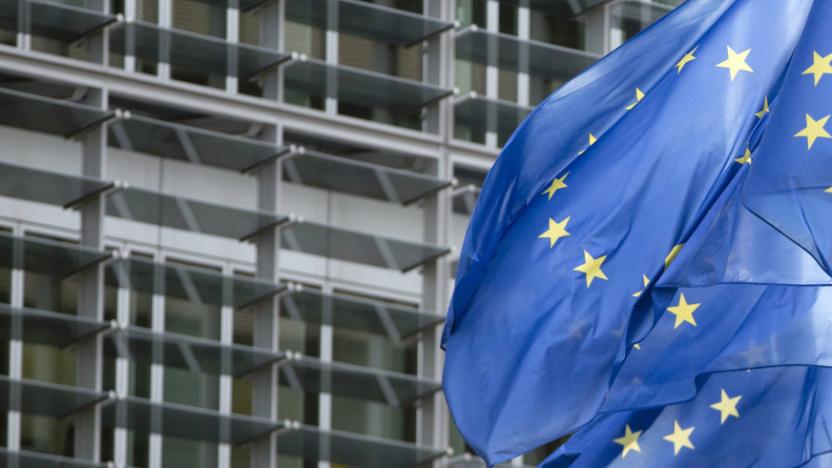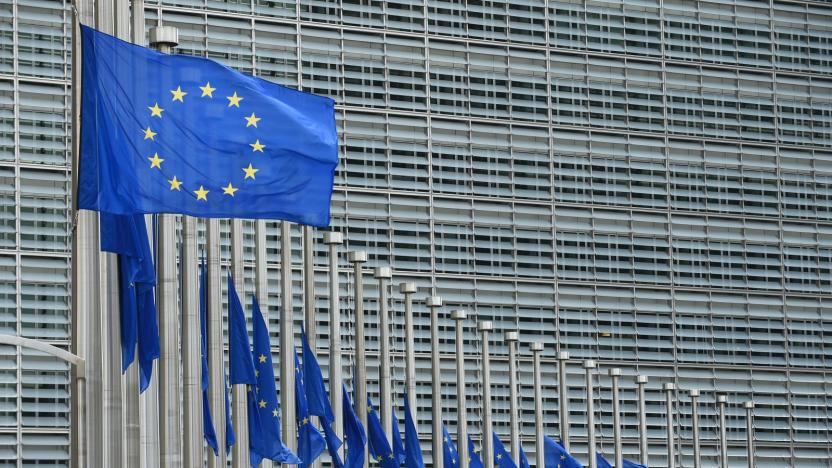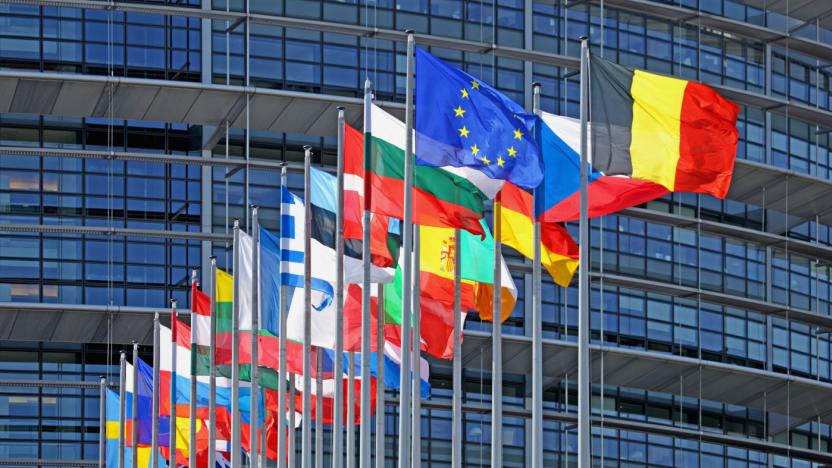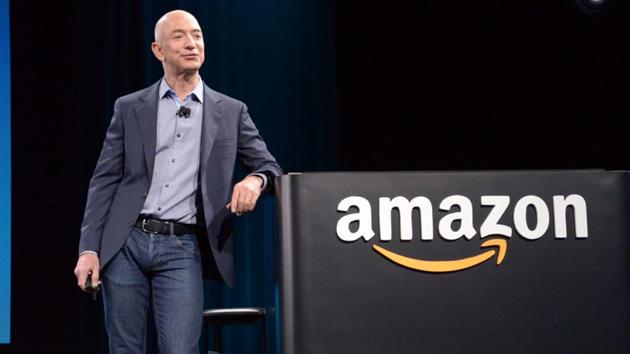ec
Latest

ASUS is being investigated for price manipulation in Europe
In one of several antitrust investigations launched today, the European Commission has begun probing tech brands ASUS, Denon & Marantz, Philips and Pioneer for suspected price manipulation. As the press release explains, the Commission believes the companies may have broken competition rules by stopping online retailers in Europe from setting their own prices for products including household appliances, laptops and hi-fi equipment. The companies also stand accused of potentially influencing price tags on a broader scale, since many retailers use software that automatically changes product pricing based on what competitors are offering.

EU probing Valve and five publishers for geo-blocking games
The legislative body of the European Union is launching an antitrust investigation into regional pricing and geo-blocking practices on Valve's Steam store. In a statement, the European Commission says it's investigating "bilateral agreements" between Valve and five publishers: Bandai Namco, Capcom, Focus Home, Koch Media and ZeniMax. The investigation is focused on activation keys, whose primary function is as an anti-piracy tool. After buying a physical copy of a game, users need to submit an activation key to prove they own it and add it to their Steam library. Once done, the game is then available on any device that the user is logged into.

Amazon offers to change ebook contracts to appease EU
Amazon stands accused of abusing its position as the largest and most influential ebook provider in Europe. Back in June 2015, the European Commission launched an investigation into the company and contract clauses which force publishers to disclose when they have received more favorable terms from rival ebook providers. That, critics argue, is anticompetitive. The intricacies of the case are unclear, but Amazon is now willing to drop the clauses from its ebook deals in Europe. Specifically, it's offered not to enforce "any clause requiring publishers to offer Amazon similar terms and conditions as those offered to Amazon's competitors."

Apple and Amazon agree to end exclusive audiobook deal
For over a decade, Apple and Audible (an Amazon company) have enjoyed an exclusivity agreement that restricted the sale of digital audiobooks. The deal ensured that Apple would only source Audible releases and that Audible would only sell its work via one platform: iTunes. The practice has helped both companies hold almost unassailable positions in the audiobook market, which led to a complaint by the German Publishers and Booksellers Association (Börsenverein des Deutschen Buchhandels) back in November 2015. After more than a year of discussions with German competition watchdog, the Bundeskartellamt, and with help from the European Commission, Apple and Amazon have agreed to terminate their existing deal, allowing Audible audiobooks to be sold via other digital music platforms.

Apple formally challenges the EU's tax demands
Apple is about to fight the European Commission's claims that it must pay the €13 billion in back taxes ($13.6 billion) it allegedly owes from its deal with Ireland. The American firm tells Reuters that it's planning to appeal the ruling this week on the grounds that it not only can't abide by the decision, but that the figures don't make sense. To start, Apple argues that the EC falsely determined that two of its business units existed solely on paper, and thus didn't justify their untaxed profits. They were real, actively managed companies, the company claims. Also, Apple reportedly can't comply with the decision without making Ireland violate past tax laws that had different rules for residents and non-residents.

EU to tech industry: Remove hate speech faster or we'll make you
Despite agreeing to crack down on the spread of hate speech across their networks earlier this year, four of the world's biggest technology companies aren't delivering on their promises, Reuters reports. A review conducted by EU Justice Commissioner Vera Jourova found that Facebook, Twitter, Google and Microsoft failed to flag and remove offensive content within 24 hours, with less than half of cases being responded to in that timeframe. If they don't improve their response times, new legislation could be introduced to force them to do so.

Europe's free roaming law won't have time limits
The European Union is back with a second shot at a free roaming plan... and while it addresses key complaints, it's raising concerns of its own. The newly proposed rules would ditch the unpopular time limits in favor of letting carriers compare your roaming habits with how you use service at home. Networks could only ask for surcharges (which top out at €0.04 per call minute, €0.01 per text and €0.0085 per megabyte) if it's clear that you're abusing your roaming access. You'd raise a warning flag if you consume way more data than you do at home, for example, or get SIM cards that remain eerily inactive until you start traveling.

European commission pulls free roaming plan after complaints
The European Commission has pulled down its free roaming plan for European residents, just days after it first posted it. "In light of the initial feedback received, President [Jean-Claude] Juncker has instructed the services to withdraw that text and to work on a new proposal," the EC said in a statement. Consumer groups had assumed that free roaming in Europe would come with no strings attached, so were surprised to see relatively short, strict limits. "The Commission is setting the bar too low," consumer group BEUC told Politico.

Europe's free roaming law comes with an asterisk
In June 2017, the European Commission will get its wish and scrap roaming charges for travellers across the continent. Phone calls, text messages and data downloads abroad will be treated as if they originated at home, but there will be a catch. In new plans set out this week, the Commission will instruct operators to let consumers roam for in Europe up to 30 days at a time, for a total of 90 days per year.

EU Commission: Apple must repay its $14.5b Irish tax break
The European Commission has ruled that Apple was given up to €13 billion ($14.5/£11.1 billion) in an illegal sweetheart tax deal with the Irish government. The amount of money involved here dwarfs the EU antitrust penalties handed out to Google, Microsoft and others, but this is effectively a backdated tax bill, rather than a fine. Officials opened the investigation into Apple's tax affairs back in 2013 and soon found that the agreement that it had signed with Ireland was illegal.

EU will watch Privacy Shield for a year before challenging
Earlier this month, the European Commission adopted Privacy Shield, an EU-US data privacy agreement. It allows companies like Facebook and Twitter to move EU data to US servers, all the while assuring Europeans their data is still as protected as it was back home. Critics have complained the new arrangement has many of the same flaws as the "Safe Harbour" framework it replaces, and EU data protection authorities had yet to comment on the final deal.

'FriWalk' is a mobility walker and a personal trainer in one
If there is one area of personal transport that is ripe for innovation, it's probably the mobility walker. Typically reserved for older generations -- complete with the stereotypical tennis ball feet (like the one used by Carl Fredricksen in Pixar's Up) -- the walker has remained largely unchanged for decades. As part of the EU's ACANTO project, researchers from six European countries have developed the Friendly Robot Walker or FriWalk, a new four wheeled walker that is fitted with depth sensors and cameras that can detect health risks from a user's gait but also serve as a personal trainer.

European regulators block Three and O2 merger
We suspected it was coming, but the European Commission has finally come out and said it: Three UK owner Hutchison Whampoa cannot buy UK carrier O2. In a statement, the Commission said that a potential merger between Three and O2 would have "reduced competition" and "resulted in higher prices," which may have negatively impacted the quality of service for UK consumers.

Europe accuses Qualcomm of paying companies to use its chips
The European Commission has sent a sternly-worded letter to Qualcomm, accusing it of abusing its position in the local market. Regulators claim that the chipmaker made "illegal payments," to an as-yet unnamed smartphone manufacturer so that it would only use Qualcomm's 3-and-4G hardware. In addition, the outfit stands accused of intentionally selling gear well below its cost price in order to put a local rival, Icera, which is now owned by NVIDIA, out of business. Those two offenses are, if proven to be true, enough for Qualcomm to be given a hefty slap by Europe.

Europe's investigating Qualcomm's mobile chip dominance
While Qualcomm enjoys a healthy hold over the mobile chip industry, regulators are wondering whether the US company has achieved its dominance in a fair manner. The company has already paid $975 million to escape an investigation into its monopolistic practises in China, but now the European Commission (EC) is on its case, today announcing it has opened two antitrust probes into the company.

Amazon finally starts paying proper taxes in European countries
For many years, Amazon has sent a huge percentage of its European revenues over to Luxembourg. The tiny country levies a much smaller rate of tax than most of the countries in which the retailer operates, allowing it to keep a larger share of sales. With the European Commission breathing down its neck over claims it had agreed an illegal tax deal with Luxembourg, Amazon has quietly begun booking sales in some of its biggest European markets. According to the Wall Street Journal, the company began paying direct taxes on sales in the UK, Germany, Italy and Spain from May 1st.

Google starts removing 'forgotten' search results
It was only a matter of time until it happened, but Google has now started removing search results from its listings as part of the European Commission's "Right to be forgotten" ruling. The Wall Street Journal reports that the company started implementing the blocks earlier today, weeks after it first started allowing individuals to request that the search giant remove listings that turned up against searches for their own names. Google says it has begun notifying successful applicants that their requests have been accepted.

Ofcom makes switching fibre broadband suppliers cheaper and easier
From July 1st, it could become a whole lot easier for you to switch between superfast broadband suppliers. After setting out its original guidance back in May, communications regulator Ofcom has gained approval from the European Commission to set new targets for BT. Currently, if you switch from one fibre-optic provider to another, Openreach (the company that controls BT's phone and broadband infrastructure) will enforce a £50 connection fee against your new ISP, which can be passed down to you. Ofcom's new rules will cut that wholesale fee down to just £11, shielding you from that value-added cost and allowing new companies to launch their own superfast services for less. Ofcom has also slashed the minimum-term contract between BT and ISPs from one year to just one month, and will force BT to fix line errors within two working days of you notifying them, if weather permits. Those small changes could make a big difference, especially if you're looking for a cheaper short-term broadband supplier.

Europe gives Dixons Carphone the green light
The £3.8 billion merger of Dixons and Carphone Warehouse has cleared a big hurdle today. After announcing their intention to join forces as Dixons Carphone in May, the European Commission has seen fit to clear the deal, allowing the two parties to begin working out what to do with their combined 3,000 stores and 35,000 employees.

Europe's next roaming charge cut comes into force on July 1st
From July, anyone travelling in any of the EU member countries with their smartphone will enjoy a few less numbers on their bill. As part of new roaming caps coming into effect next week, the European Commission has cut the price of data downloads by 55 percent. This means the most you'll pay for a megabyte is 20 cents instead of 45. As promised by the Commission's VP Neelie Kroes, the new price caps will also drop call charges by 21 percent to 19 cents per minute, while receiving calls will be reduced to 5 cents per minute. Text message costs are down 25 percent to 6 cents, but it's the lower cost of data roaming that's the banner announcement, meaning smartphone owners can safely sneak in a quick tweet or Instagram upload while they're making their way across Europe. Some customers, like those on Three in the UK, can bypass charges completely by way of free roaming plans, but for those who find themselves in an unsupported country, the new rates could lighten possible bill shocks in the future.






